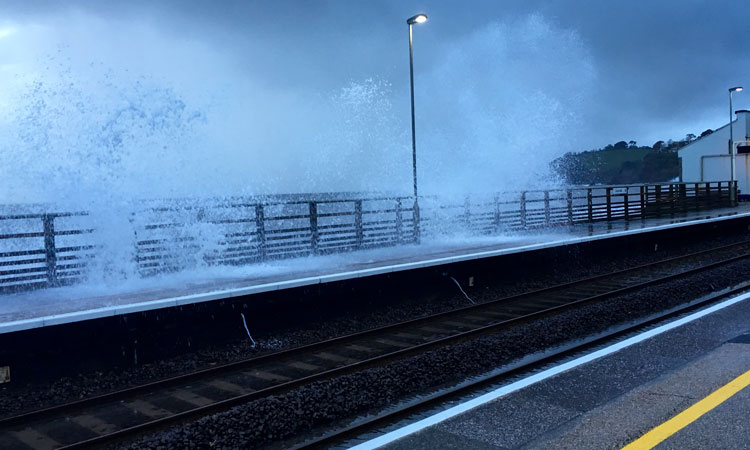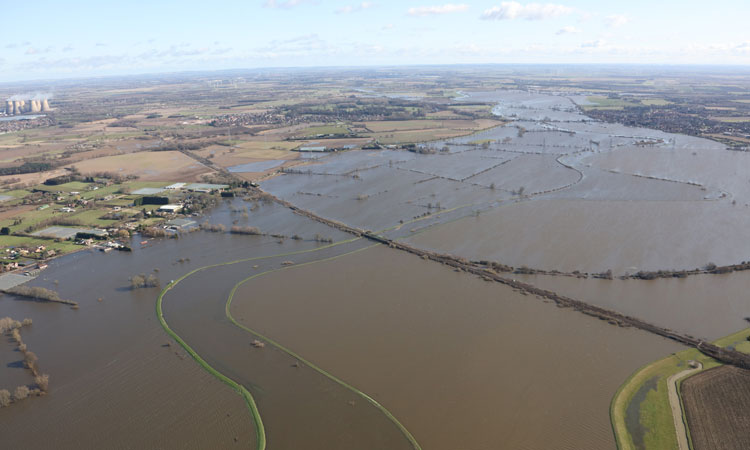Taskforce formed to deliver more reliability during adverse weather
Posted: 25 November 2022 | Global Railway Review | No comments yet
Network Rail, Newcastle University, the Met Office and MetDesk, have teamed up on a Weather Academy pilot programme which aims to identify ways of delivering safer, more reliable train services in Britain during adverse weather.


Waves over Dawlish railway station platforms. Credit: Network Rail
Network Rail is collaborating with Newcastle University, the Met Office and MetDesk on a Weather Academy pilot programme, bringing together rail operations staff, asset engineers and meteorology experts to identify ways of delivering a safer, more reliable rail service for passengers and freight during adverse and extreme weather.
Following the recommendations of world-renowned meteorology expert Dame Julia Slingo, Professor Paul Davies (the Met Office) and Professor Hayley Fowler (Newcastle University) on how the railway could better manage weather and climate risk, Network Rail is working closely with industry experts to empower railway workers with the right knowledge to improve mitigation against the impacts of adverse weather conditions so passengers and freight can continue to move safely and reliably.
Network Rail staff joined a workshop event that focused on practical case studies, interactive tuition and scenario-based exercises to improve the management of weather risks, arming them with the knowledge and skills required to improve how these risks are managed and mitigated.
Considering risks and managing adverse weather
More frequent and more extreme weather conditions caused by climate change are increasingly impacting the ability to run the railway safely and on time.
“This is a landmark event,” explained Dame Julia Slingo, lead author of the Weather Advisory Task Force report. “This is the first time, in the transport sector at least, that we got people together to think about how you manage the considerable risks to operations that you face from adverse weather and related hazards.”
Matthew Shelton, Network Rail Asset Engineer, added “I found the workshop illuminating, fascinating and extremely useful. The level of information provided enhanced my knowledge and broadened my understanding of several critical areas of the business. I will be a more effective, more aware and more empathic risk manager as a result.”


Photo showing extent of flooding of the railway line near Drax power plant. Credit: Network Rail
Network Rail has committed to running a safe, affordable and more reliable service for passengers during adverse and extreme weather as a key pillar of its’ wide-reaching Environmental Sustainability strategy.
More frequent and more extreme weather conditions caused by climate change are increasingly impacting the ability to run the railway safely and on time. As well as improving workers’ knowledge on how to counteract these risks, embedding resilience into the way that railway assets are designed, built, operated and maintained will play a key role in keeping the railway running in adverse conditions.
Network Rail also announced in July 2022 that a new extreme weather taskforce was being launched following the unprecedented weather conditions during the summer months.
The taskforce will consider four key areas, each led by an independent expert in their field. Three of these areas will be focused on gathering insights from other countries and making comparisons with international rail networks that are more used to dealing with extreme heat and fluctuations in temperature.
Related content you will enjoy:
Fleet of specialist trains and drones to keep UK rail routes clear of leaves in Autumn
WATCH: Drone footage to assess flooded railway tracks
Network Rail completes Cambrian Line extreme weather resilience project
Related topics
Adverse Weather, Operational Performance, Regulation & Legislation








